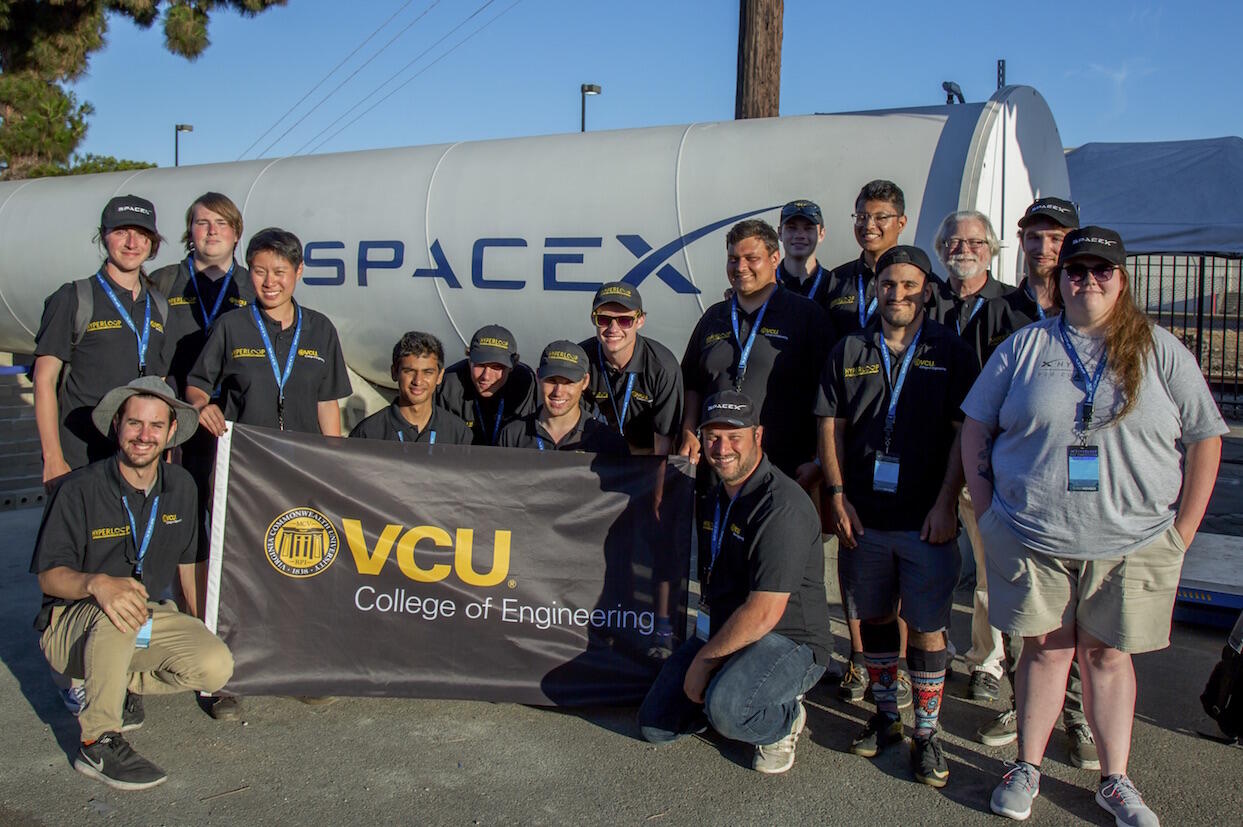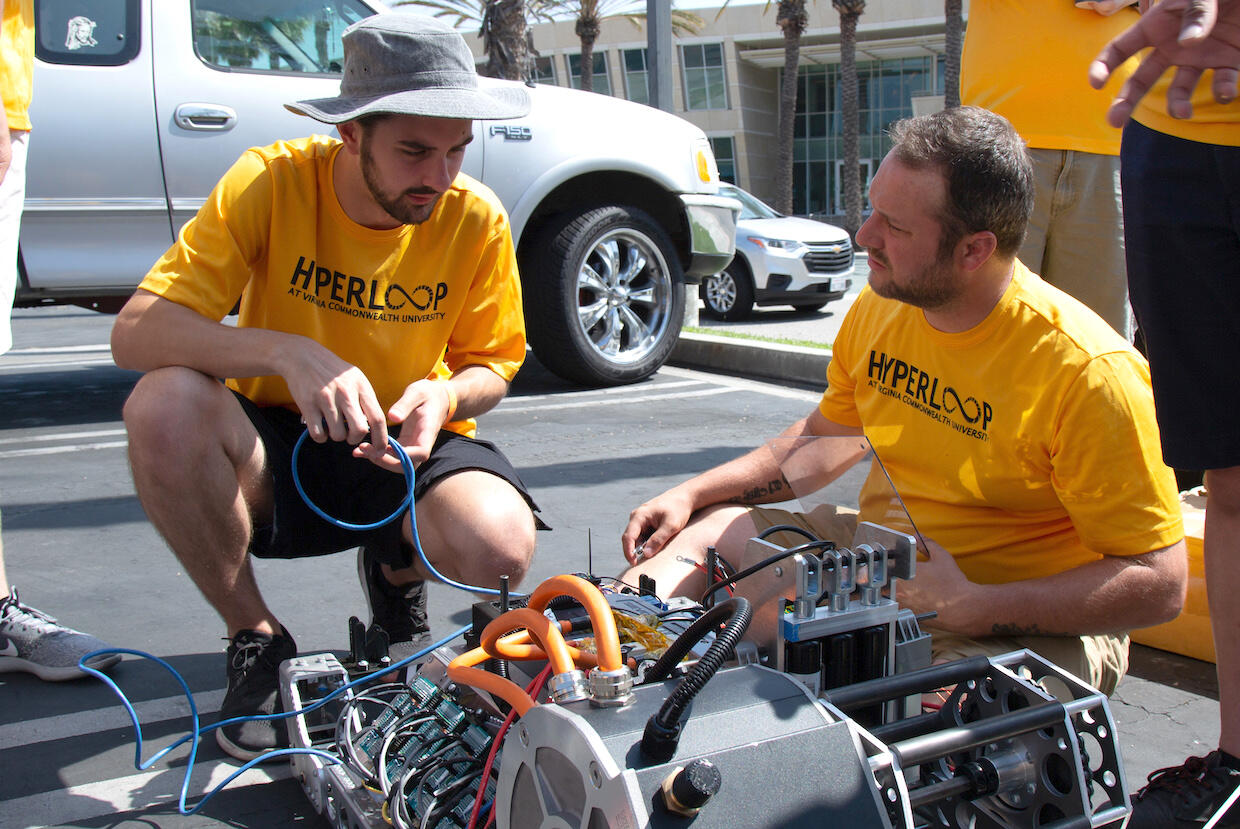
Aug. 9, 2018
After SpaceX debut, Hyperloop at VCU sets sights on the future
Share this story
SpaceX will host a fourth Hyperloop Pod Competition next year. Arthur Chadwick plans to be there.
“A lot of planning will happen very soon,” said Chadwick, president of Hyperloop at VCU and a rising junior in the Virginia Commonwealth University College of Engineering. “We all understand each other better [after competing in this year’s competition] and how each other works, and this time, we have a full year to really think about and prepare things instead of working twice as hard in half the time.”
Under Chadwick’s leadership, Hyperloop at VCU, which formed less than a year ago, was one of only 20 teams worldwide and one of only nine from the United States to compete in the 2018 Hyperloop finals. The international contest challenges university teams to design and build the best pod for Hyperloop, a high-speed ground transport concept by SpaceX founder Elon Musk.
Twenty students from VCU made the trip to the finals in Hawthorne, California, and a dozen core members worked long hours to integrate the pod’s multiple complex systems of mechanical, propulsion, electrical, braking and software controls.
Now back in Richmond, VCU’s team of engineering, business, government and arts students is inspired and eager to return to SpaceX in 2019.
‘It’s been surreal’
VCU’s pod earned praise from SpaceX engineers for being simple and lightweight. Teams competing at the Hyperloop finals undergo a week of safety and performance tests, one of which involves operating the pod atop an I-beam rail inside a test tube. Brendan Fisher, Hyperloop at VCU vice president and mechanical co-lead and a rising junior mechanical engineering student, said the team can remove a lot of variables next year by designing the pod to ride on top of the I-beam rail as some teams have, instead of beneath it.
“I think we’ve learned a lot and that’s what I wanted to do out here,” said Tyler Brayton, a mechanical engineering student and pod design lead. “My goal out here was to learn how the entire testing week goes.”
For some, a major takeaway from this year’s competition is the importance of planning ahead, whether in writing operational procedures that SpaceX requires or in sourcing parts early and communicating more with suppliers to avoid last-minute surprises.
“Being around SpaceX and understanding how they function and operate is super helpful for next year,” said Matthew Kozak, controls co-lead and a computer engineering student. “I think our biggest learning experience was the whole process of designing a product, having requirements, determining what the best options are for that and ending at a point, then having to revise it.”
Kozak was describing an iterative process of design and improvement the team wants to formalize next year through a project management system to help keep all systems on schedule.
For Sudhansu Shrestha, his training as a double major in computer engineering and computer science played a large part in allowing him to contribute to the pod’s functionality.
“It’s been a great experience, seeing how I can apply knowledge of both areas at once,” he said. “Taking something we imagined and transforming it to a reality, it’s been surreal. A couple of months ago, we were unsure we were going to get it and now, here we are.”
Logan Schorr, a rising first-year student at VCU and the youngest member of the team, said the experience has given him a glimpse into his future as a mechanical engineer.
“I have a bunch of friends in Hyperloop that I didn’t have and will have people in other classes to look to for advice on things,” he said. “It’s just really cool being able to do an experience as not even a freshman quite yet.
“[I] soaked up the experience as much as I could, and the awe of being in a SpaceX building and talking to the SpaceX engineers — that was fantastic.”
Nearly all team members expressed appreciation for the knowledge gained as first-time competitors.
“This whole process has allowed us to next year be really prepared to crush through all those checklist points, really before we even get here. That’s exciting,” said Patrick Welch, a rising senior mechanical engineering student and mechanical co-lead. “It’s less like a competition and more like a camaraderie where people are coming together to show off what they did and see how they can get through the testing.”

‘It’s a culmination of people’s ideas’
Welch said VCU is now part of a global network to advance this new concept of high-speed transportation.
The day after the Hyperloop competition at SpaceX, scientists, academics and government officials gathered at UCLA for the first international Hyperloop Advanced Research Partnership conference. Topics and speakers focused on broad issues for transportation of passengers and freight via Hyperloops, including advanced technologies, terminal/station design, right-of-way issues, construction, costs, funding and public policy.
Chadwick and Hyperloop at VCU faculty adviser L. Franklin Bost, executive associate dean for innovation and outreach in the College of Engineering, attended the conference and participated in a poster session about VCU’s Hyperloop team. The conference brought a global perspective on the development of Hyperloop technologies and transit systems in Asia, Europe and the U.S.
“The thing that sticks in my mind is this is a movement on a much larger scale and this organization [Hyperloop at VCU] is just a small part of something that’s going to be procured and refined over the next decade or so,” Chadwick said. “It’s a culmination of people’s ideas. Everything is encompassed into the Hyperloop: People want something innovative, people want something that is clean energy, people want to communicate faster and people want to be a part of something that’s bigger than themselves.
“I hope that this competition, throughout the entire year, has inspired and sparked a lot of people at VCU and alumni and mentors to contribute because all these teams want to make something better and we’re one of those teams that wants to do just that.”
Subscribe to VCU News
Subscribe to VCU News at newsletter.vcu.edu and receive a selection of stories, videos, photos, news clips and event listings in your inbox.










